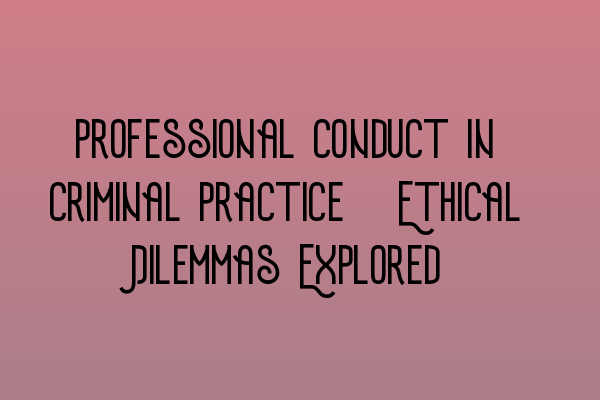Professional Conduct in Criminal Practice: Ethical Dilemmas Explored
When it comes to practicing criminal law, professionals are often faced with ethical dilemmas that require careful consideration. The nature of this area of law brings about complex situations that can test a lawyer’s professional conduct. In this blog post, we will explore some of the common ethical dilemmas encountered in criminal practice and discuss the importance of upholding the highest ethical standards.
The Duty of Confidentiality
One of the fundamental principles of legal practice is the duty of confidentiality between a lawyer and their clients. Lawyers must maintain the confidentiality of their clients’ information, ensuring that sensitive details are not disclosed to third parties. This duty is essential for preserving the trust between lawyer and client and promoting open communication. To learn more about this topic, you can refer to our SQE 1 Practice Exam Questions article.
Conflict of Interest
Another ethical dilemma that often arises in criminal practice is conflict of interest. Lawyers must ensure that they do not have any personal, financial, or professional interests that might compromise their ability to provide unbiased legal representation. Identifying and managing potential conflicts of interest is crucial for maintaining the integrity of the legal profession. If you are interested in practicing criminal law, it’s essential to learn how to navigate and address conflicts of interest. Our SQE 1 Practice Mocks FLK1 FLK2 article can provide valuable insights on this subject.
Client Confidentiality versus Reporting Obligations
In some cases, lawyers may come across situations where their client’s actions raise concerns about criminal activity. Balancing the duty of confidentiality with reporting obligations can be challenging for legal professionals. While it is essential to respect client confidentiality, lawyers also have a professional and moral duty to prevent potential harm to others. Understanding when and how to make necessary reporting decisions while upholding client trust is a critical aspect of criminal practice. Our SQE 2 Preparation Courses can provide you with the knowledge and skills required to navigate this ethical dilemma confidently.
Representing Guilty Clients
One of the most debated ethical dilemmas in criminal practice is the situation where a lawyer is aware of their client’s guilt. While lawyers are obligated to provide a strong defense for their clients, what happens when confronted with overwhelming evidence of guilt? This situation can test a lawyer’s professional conduct and raise questions about the ethical limits of criminal defense. Our SQE 1 Preparation Courses can help aspiring criminal lawyers explore this topic in-depth.
Conclusion
Professional conduct in criminal practice is essential for maintaining public trust in the legal system. Ethical dilemmas may arise, challenging lawyers’ integrity and decision-making abilities. By understanding and addressing these dilemmas, legal professionals can ensure they uphold the core values of their profession. To stay updated with the latest legal practices and regulations, be sure to keep an eye on SRA SQE Exam Dates and explore our resources on ethical decision-making.
